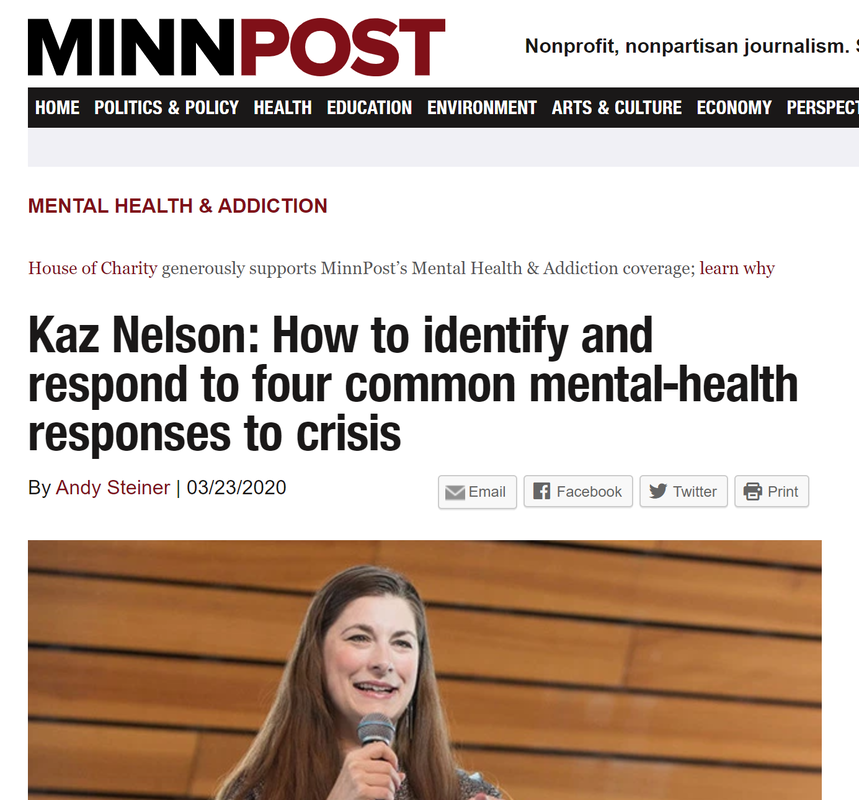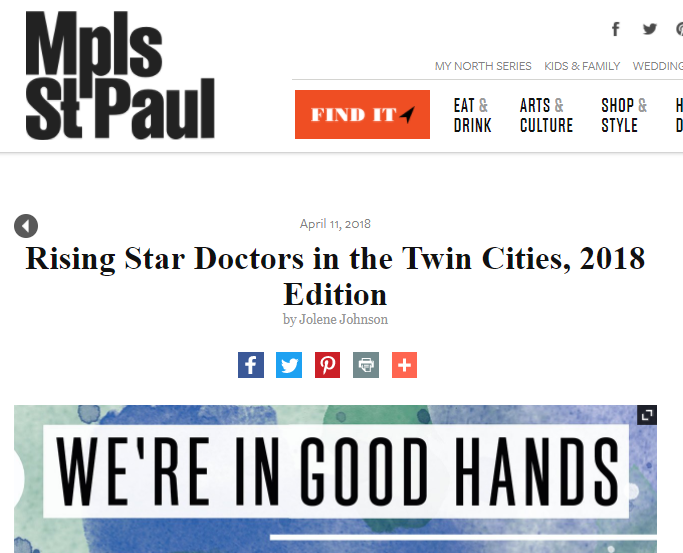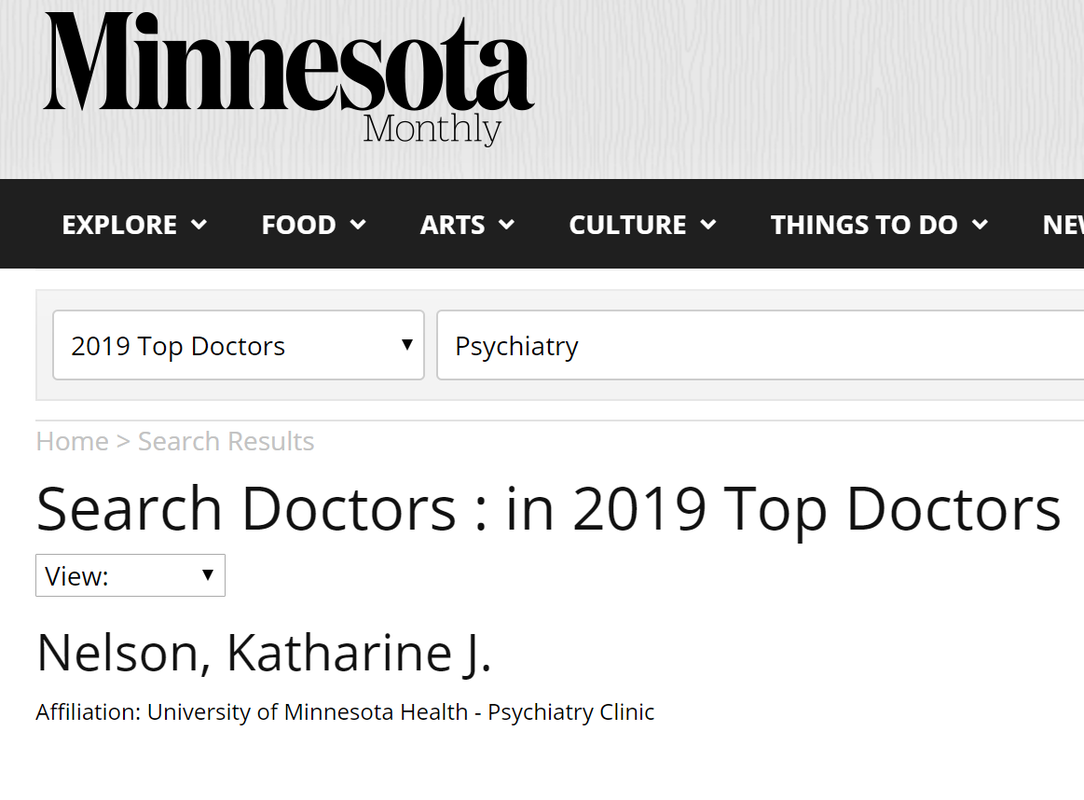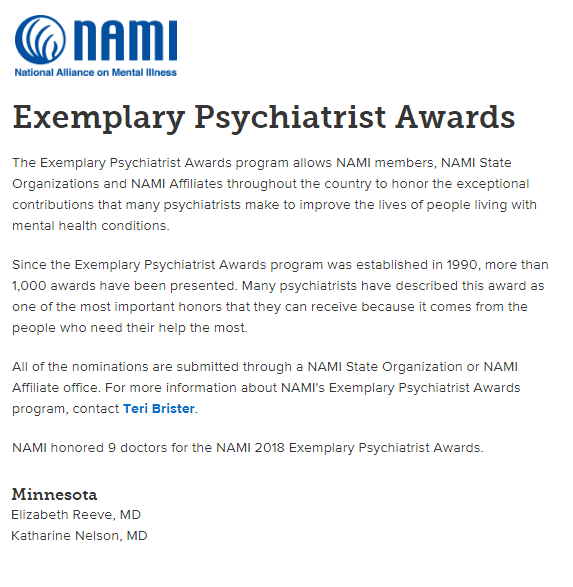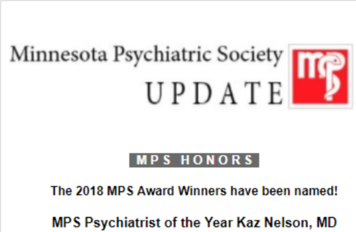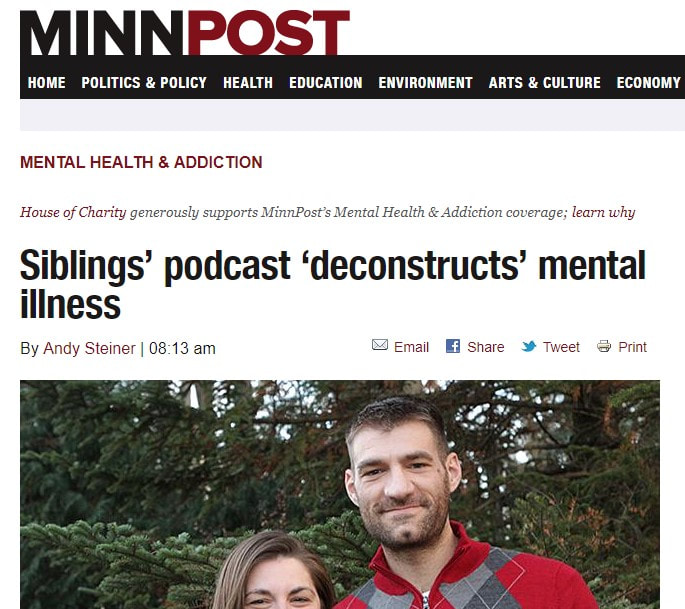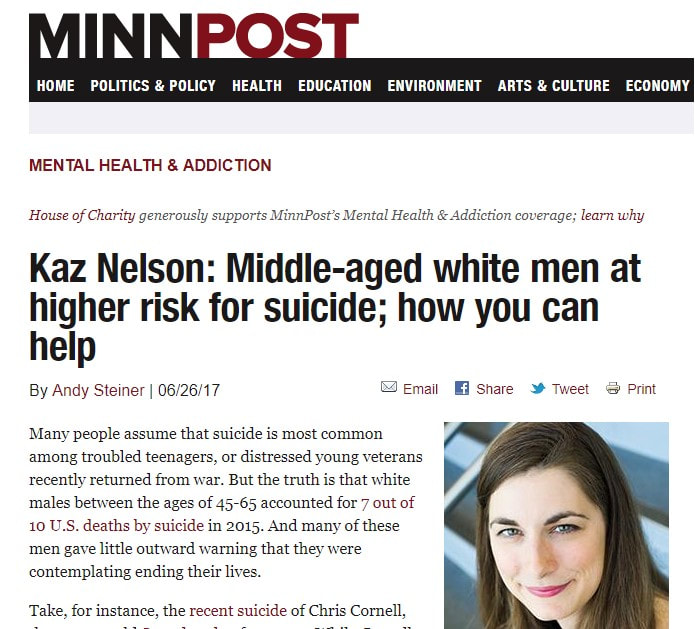Who we are and what we stand for
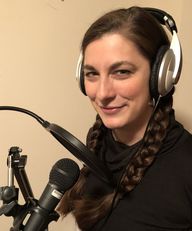
Dr. Kaz Nelson, a psychiatrist at the University of Minnesota, along with host, George, serve as translators between the psychiatric field and the non-medical community. Podcast goals: Dispel myths, address listener questions, talk directly about serious topics, such as suicide, and inform the public about what they need to know to maintain mental health and a life worth living.
Dr. Kaz Nelson is an American Board of Psychiatry and Neurology certified psychiatrist and Associate Professor in the Department of Psychiatry and Behavioral Sciences at the University of Minnesota. Dr. Kaz is driven in her mission to increase knowledge and understanding for those living with mental illness and their loved ones.
George, a former US Marine and attorney who practices in the field of child welfare, is Kaz's brother and serves as podcast host and banter man. George's educational background is in health and human services and he has applied his life to public service.
Kaz and George are Minnesota born-and-raised.
This podcast is an independently produced labor of love and not sponsored by any commercial entity, including the pharmaceutical industry.
MinnPost article, 3/23/20, by: Andy Steiner
Katharine ("Kaz") Nelson, MD - Mpls St. Paul Magazine
2018, 2019, and 2020 Top Doctor: Rising Stars Edition!
Dr. Kaz Nelson named "Top Doctor" by Minnesota Monthly Magazine 2019!
Dr. Kaz Nelson awarded "2018 Exemplary Psychiatrist"
by the National Alliance on Mental Illness Minnesota!
Dr. Kaz Nelson awarded "Psychiatrist of the Year"
by The Minnesota Psychiatric Society!
MinnPost article, 3/5/18, by: Andy Steiner
Dr. Kaz Nelson is Driven to Reduce Mental Health Stigma
Suicide in Men
An article in MinnPost on 6/26/17 on the topic of suicide in men, by Andy Steiner.
Kaz Nelson on Minnesota Public Radio
When doctors become patients: Med schools put new emphasis on mental health for residents
From mprnews.org with Alisa Roth on 6/25/2019
Medicine is a demanding business. But the culture of medicine also contributes to the problem.
"We're really conditioned to appear competent and confident and professional," Nelson said. "And that's the face we want to represent to our public and the community we serve ... the people evaluating us. So we've essentially set up a system where perfectionism is rewarded and struggle can be punished at different times."
Patients wouldn't want to go to a doctor who doesn't seem to know what she's doing and doctors know that, so there's tremendous pressure not to acknowledge difficulties.
And "that's why it's imperative that we're proactive in saying, of course, people are going to struggle, of course this is tough work," Nelson said.
To hear the full discussion use this audioplayer.
From mprnews.org with Alisa Roth on 6/25/2019
Medicine is a demanding business. But the culture of medicine also contributes to the problem.
"We're really conditioned to appear competent and confident and professional," Nelson said. "And that's the face we want to represent to our public and the community we serve ... the people evaluating us. So we've essentially set up a system where perfectionism is rewarded and struggle can be punished at different times."
Patients wouldn't want to go to a doctor who doesn't seem to know what she's doing and doctors know that, so there's tremendous pressure not to acknowledge difficulties.
And "that's why it's imperative that we're proactive in saying, of course, people are going to struggle, of course this is tough work," Nelson said.
To hear the full discussion use this audioplayer.
Those disturbing thoughts might just be your body's way of protecting you
From mprnews.org with Tom Crann on 6/19/2019
You're walking across a bridge or standing on a balcony and suddenly think about how awful it would be to fall over. You might feel alarmed, or even ashamed that your brain could entertain the idea. But Dr. Kaz Nelson, a psychiatrist at the University of Minnesota, says just about everyone has been there.
"Usually these intrusive thoughts are related to anxiety signals in the body, where the body is noticing that there may be harm, or potential for harm," Nelson said. "And so the body mechanisms will put this intrusive thought in the brain to say, 'Hey, don't do this.'"
Nelson said intrusive thoughts are especially common among new parents, who are also less likely to talk about it because they fear it reflects on their parenting.
To hear the full discussion use this audioplayer.
From mprnews.org with Tom Crann on 6/19/2019
You're walking across a bridge or standing on a balcony and suddenly think about how awful it would be to fall over. You might feel alarmed, or even ashamed that your brain could entertain the idea. But Dr. Kaz Nelson, a psychiatrist at the University of Minnesota, says just about everyone has been there.
"Usually these intrusive thoughts are related to anxiety signals in the body, where the body is noticing that there may be harm, or potential for harm," Nelson said. "And so the body mechanisms will put this intrusive thought in the brain to say, 'Hey, don't do this.'"
Nelson said intrusive thoughts are especially common among new parents, who are also less likely to talk about it because they fear it reflects on their parenting.
To hear the full discussion use this audioplayer.
Self-harm is up sharply among girls -- what's behind it and how to help
From mprnews.org with Tom Crann on 5/22/2019
The National Alliance on Mental Illness says it's not uncommon for people to harm themselves on purpose, especially adolescents and young adults. But health care providers are concerned about a significant increase in the behavior over the past decade.
A study from the Centers for Disease Control found the rate of self-harm went relatively unchanged prior to 2009, and then shot up threefold among girls ages 10 to 14 between 2009 and 2015. The trend dovetails with a study out this month that says the suicide rate among girls 10 to 14 is growing faster than the rate for boys of the same age.
To hear the full discussion use this audioplayer.
From mprnews.org with Tom Crann on 5/22/2019
The National Alliance on Mental Illness says it's not uncommon for people to harm themselves on purpose, especially adolescents and young adults. But health care providers are concerned about a significant increase in the behavior over the past decade.
A study from the Centers for Disease Control found the rate of self-harm went relatively unchanged prior to 2009, and then shot up threefold among girls ages 10 to 14 between 2009 and 2015. The trend dovetails with a study out this month that says the suicide rate among girls 10 to 14 is growing faster than the rate for boys of the same age.
To hear the full discussion use this audioplayer.
The 'silent shortage' of rural mental health workers
From mprnews.org with Kerri Miller on 11/19/18
If you've had to wait weeks, even months, to see a psychiatrist you're not alone. Minnesota is part of a national trend in a shortage of mental health counselors at a time when roughly one in five Americans will experience a mental health problem as an adult.
The shortage is most acute if you are looking for help in rural America or if you're hoping to see a counselor of color.
How did we get here? And what are the consequences of such an urgent shortage?
To hear the full discussion, use this audio player.
College Mental Health
From mprnews.org with Kerri Miller on 8/30/17
How can colleges help depressed students?
Annually, Penn State collects information from students seeking mental health services at hundreds of universities. Data collected from the 2015-2016 school year showed, "anxiety and depression continue to be the most common presenting concerns for college students as identified by counseling center staff."
Kaz Nelson of the University of Minnesota's Department of Psychiatry, and Gregory Eells of Cornell's Counseling and Psychology Services, shared what colleges are doing to help students and what signs of depression parents should look for in their children.
To hear the full discussion use this audioplayer.
From mprnews.org with Kerri Miller on 11/19/18
If you've had to wait weeks, even months, to see a psychiatrist you're not alone. Minnesota is part of a national trend in a shortage of mental health counselors at a time when roughly one in five Americans will experience a mental health problem as an adult.
The shortage is most acute if you are looking for help in rural America or if you're hoping to see a counselor of color.
How did we get here? And what are the consequences of such an urgent shortage?
To hear the full discussion, use this audio player.
College Mental Health
From mprnews.org with Kerri Miller on 8/30/17
How can colleges help depressed students?
Annually, Penn State collects information from students seeking mental health services at hundreds of universities. Data collected from the 2015-2016 school year showed, "anxiety and depression continue to be the most common presenting concerns for college students as identified by counseling center staff."
Kaz Nelson of the University of Minnesota's Department of Psychiatry, and Gregory Eells of Cornell's Counseling and Psychology Services, shared what colleges are doing to help students and what signs of depression parents should look for in their children.
To hear the full discussion use this audioplayer.



